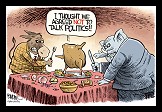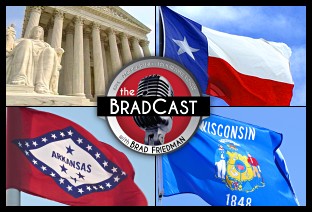Despite uncontested findings of purposeful discrimination in the GOP law, strict new Photo ID restrictions allowed to take effect...
- with Brad Friedman
 As the plaintiffs in the otherwise successful challenge to Texas Republicans' polling place Photo ID restriction law pointed out during their emergency petition to the U.S. Supreme Court earlier this week --- after an appeals court panel had temporarily stayed a lower court's determination that the law was discriminatory and thus, stricken down --- it was the High Court itself which, when it gutted a central provision of the Voting Rights Act last year, promised there were other provisions still standing in the landmark VRA that could adequately be used to prevent discriminatory voting laws in all 50 states.
As the plaintiffs in the otherwise successful challenge to Texas Republicans' polling place Photo ID restriction law pointed out during their emergency petition to the U.S. Supreme Court earlier this week --- after an appeals court panel had temporarily stayed a lower court's determination that the law was discriminatory and thus, stricken down --- it was the High Court itself which, when it gutted a central provision of the Voting Rights Act last year, promised there were other provisions still standing in the landmark VRA that could adequately be used to prevent discriminatory voting laws in all 50 states.
"Our decision in no way affects the permanent, nationwide ban on racial discrimination in voting found in [Section] 2" of the Voting Rights Act, the John Roberts Supreme Court majority declared at the time. Apparently they were just kidding.
As the plaintiffs in the case persuasively argued in a filing at the court on Friday, "If voters cannot be protected after findings --- including a finding of intentional racial discrimination --- and a permanent injunction in a case where there was a year of discovery, nine days of trial, and an exhaustive, comprehensive District Court opinion, then when will they be?"
The answer to that question came back from the Court in the form of a pre-dawn order [PDF] issued Saturday morning upholding the appellate court's ruling that, even though the law, SB 14, is discriminatory, as found by the lower court after a full trial on the merits, the Photo ID restrictions that are likely to disenfranchise some 600,000 legally registered and disproportionately minority voters in the Lone Star State will be back in effect for this November's mid-term elections.
The trial earlier this year, challenging the law under both the U.S. Constitution and Section 2 of the Voting Rights Act --- the section that SCOTUS had previously announced was more than adequate to protect voters --- determined that the Texas law "creates an unconstitutional burden on the right to vote, has an impermissible discriminatory effect against Hispanics and African-Americans, and was imposed with an unconstitutional discriminatory purpose." U.S. District Court Judge Nelva Gonzales Ramos also found in her 147-page ruling, that "SB 14 constitutes an unconstitutional poll tax."
Texas had already required ID for every single polling place voter in the state from 2003 to 2013, and even though state Republicans' even more extreme version of Photo ID restrictions on voting instituted by SB 14 had already been found racially discriminatory by the U.S. Dept. of Justice and again by a U.S. District Court in D.C. based on data supplied by the state of Texas itself, and now, once again, found both discriminatory and unconstitutional by a U.S. District Court in Texas after a full trial, the U.S. Supreme Court upheld an appellate court stay issued this week on the basis that the lower court's ruling came just too close to the election to change the rules at this point.
The 5th Circuit Court of Appeal had reasoned that it was better for all 600,000+ voters to face potential disenfranchisement under the racially-motivated law, rather than just a few who might face a poll worker that didn't receive adequate notice that the more restrictive ID law --- the one allowing concealed weapons permits, but not state-issued Student IDs, the one that doesn't even allow U.S. Government Veterans IDs as proof of identity for voting --- had been approved for use. It appears that a majority of Supreme Court Justices agreed.
Like the appellate court, the SCOTUS majority did not dispute any of the District Court's findings nor explain why those findings did not outweigh the "potential" disruption of the Lone Star State's electoral apparatus on the eve of an election. Its cursory order, however, leaves no room for doubt that the Court has expanded what is known as "the Purcell principle" so that, no matter how egregious the law in question, no matter the evidence establishing deliberate racial discrimination and widespread disenfranchisement, the Court will apply a per se rule that an injunction barring the illegal disenfranchisement of voters will be stayed if it is issued in close proximity to the start of an election.
While the SCOTUS majority failed to offer a written opinion to explain their decision to allow massive disenfranchisement in Texas this year, Justice Ruth Bader Ginsburg, writing on behalf of herself and Justices Sotomayor and Kagan, provided a tightly written dissent offering documented facts and uncontested evidence to support her opinion that the Supreme Court should have vacated the 5th Circuit's last minute stay of the lower court ruling...
--- Click here for REST OF STORY!... ---
 Despite a larger population and a contested race for an open gubernatorial seat, turnout in the state of Texas was reportedly down this year, as compared to the last mid-term election in 2010, by more than a quarter of a million votes.
Despite a larger population and a contested race for an open gubernatorial seat, turnout in the state of Texas was reportedly down this year, as compared to the last mid-term election in 2010, by more than a quarter of a million votes.

 Sunday 'No Such Agreement' Toons
Sunday 'No Such Agreement' Toons How (and Why!) to 'Extend an Olive Branch' to MAGA Family Members Over the Holidays: 'BradCast' 11/21/24
How (and Why!) to 'Extend an Olive Branch' to MAGA Family Members Over the Holidays: 'BradCast' 11/21/24 'Green News Report' 11/21/24
'Green News Report' 11/21/24
 Former Federal Prosecutor: Trump Must Be Sentenced in NY Before Taking Office Again: 'BradCast' 11/20/24
Former Federal Prosecutor: Trump Must Be Sentenced in NY Before Taking Office Again: 'BradCast' 11/20/24 'Bullet Ballot' Claims, Other Arguments for Hand-Counting 2024 Battleground Votes: 'BradCast' 11/19/24
'Bullet Ballot' Claims, Other Arguments for Hand-Counting 2024 Battleground Votes: 'BradCast' 11/19/24 'Green News Report' 11/19/24
'Green News Report' 11/19/24 Trump Already Violating Law (He Signed!) During Transition: 'BradCast' 11/18/24
Trump Already Violating Law (He Signed!) During Transition: 'BradCast' 11/18/24 Sunday 'Into the Gaetz of Hell' Toons
Sunday 'Into the Gaetz of Hell' Toons Computer Security Experts Ask Harris to Seek Hand-Counts Due to Voting System Breaches: 'BradCast' 11/14/24
Computer Security Experts Ask Harris to Seek Hand-Counts Due to Voting System Breaches: 'BradCast' 11/14/24 'Green News Report' 11/14/24
'Green News Report' 11/14/24 Trump Criminal Cases Fade, as GOP 'Does Not Believe in Rule of Law': 'BradCast' 11/13/24
Trump Criminal Cases Fade, as GOP 'Does Not Believe in Rule of Law': 'BradCast' 11/13/24 Climate Advocates Brace for Fight With Trump 2.0: 'BradCast' 11/12/24
Climate Advocates Brace for Fight With Trump 2.0: 'BradCast' 11/12/24 Let It All Out: 'BradCast' 11/11/24
Let It All Out: 'BradCast' 11/11/24 Not All Bad: Abortion Rights Won Big (Almost) Everywhere: 'BradCast' 11/7/24
Not All Bad: Abortion Rights Won Big (Almost) Everywhere: 'BradCast' 11/7/24 U.S. CHOOSES CONVICTED CRIMINAL, ADJUDICATED RAPIST: 'BradCast' 11/6/24
U.S. CHOOSES CONVICTED CRIMINAL, ADJUDICATED RAPIST: 'BradCast' 11/6/24 ELECTION DAY 2024: Tea Leaves, Probs for Voters, What's Next: 'BradCast' 11/5/24
ELECTION DAY 2024: Tea Leaves, Probs for Voters, What's Next: 'BradCast' 11/5/24 'Closing Arguments' for Undecideds, Third-Party Voters: 'BradCast' 11/4/24
'Closing Arguments' for Undecideds, Third-Party Voters: 'BradCast' 11/4/24 The GOP 'Voter Fraud' Before the Storm: 'BradCast' 10/31/24
The GOP 'Voter Fraud' Before the Storm: 'BradCast' 10/31/24
 VA GOP VOTER REG FRAUDSTER OFF HOOK
VA GOP VOTER REG FRAUDSTER OFF HOOK Criminal GOP Voter Registration Fraud Probe Expanding in VA
Criminal GOP Voter Registration Fraud Probe Expanding in VA DOJ PROBE SOUGHT AFTER VA ARREST
DOJ PROBE SOUGHT AFTER VA ARREST Arrest in VA: GOP Voter Reg Scandal Widens
Arrest in VA: GOP Voter Reg Scandal Widens ALL TOGETHER: ROVE, SPROUL, KOCHS, RNC
ALL TOGETHER: ROVE, SPROUL, KOCHS, RNC LATimes: RNC's 'Fired' Sproul Working for Repubs in 'as Many as 30 States'
LATimes: RNC's 'Fired' Sproul Working for Repubs in 'as Many as 30 States' 'Fired' Sproul Group 'Cloned', Still Working for Republicans in At Least 10 States
'Fired' Sproul Group 'Cloned', Still Working for Republicans in At Least 10 States FINALLY: FOX ON GOP REG FRAUD SCANDAL
FINALLY: FOX ON GOP REG FRAUD SCANDAL COLORADO FOLLOWS FLORIDA WITH GOP CRIMINAL INVESTIGATION
COLORADO FOLLOWS FLORIDA WITH GOP CRIMINAL INVESTIGATION CRIMINAL PROBE LAUNCHED INTO GOP VOTER REGISTRATION FRAUD SCANDAL IN FL
CRIMINAL PROBE LAUNCHED INTO GOP VOTER REGISTRATION FRAUD SCANDAL IN FL Brad Breaks PA Photo ID & GOP Registration Fraud Scandal News on Hartmann TV
Brad Breaks PA Photo ID & GOP Registration Fraud Scandal News on Hartmann TV  CAUGHT ON TAPE: COORDINATED NATIONWIDE GOP VOTER REG SCAM
CAUGHT ON TAPE: COORDINATED NATIONWIDE GOP VOTER REG SCAM CRIMINAL ELECTION FRAUD COMPLAINT FILED AGAINST GOP 'FRAUD' FIRM
CRIMINAL ELECTION FRAUD COMPLAINT FILED AGAINST GOP 'FRAUD' FIRM RICK SCOTT GETS ROLLED IN GOP REGISTRATION FRAUD SCANDAL
RICK SCOTT GETS ROLLED IN GOP REGISTRATION FRAUD SCANDAL VIDEO: Brad Breaks GOP Reg Fraud Scandal on Hartmann TV
VIDEO: Brad Breaks GOP Reg Fraud Scandal on Hartmann TV RNC FIRES NATIONAL VOTER REGISTRATION FIRM FOR FRAUD
RNC FIRES NATIONAL VOTER REGISTRATION FIRM FOR FRAUD EXCLUSIVE: Intvw w/ FL Official Who First Discovered GOP Reg Fraud
EXCLUSIVE: Intvw w/ FL Official Who First Discovered GOP Reg Fraud GOP REGISTRATION FRAUD FOUND IN FL
GOP REGISTRATION FRAUD FOUND IN FL



















 It's been happening for years now. On the day after elections like last Tuesday's, media figures begin navel gazing to figure out how pre-election polls, created by dozens of independent pollsters using dozens of different methodologies, could all find the same thing but turn out to be so wrong once the election results are in.
It's been happening for years now. On the day after elections like last Tuesday's, media figures begin navel gazing to figure out how pre-election polls, created by dozens of independent pollsters using dozens of different methodologies, could all find the same thing but turn out to be so wrong once the election results are in.
 According to a
According to a 
 With the latest
With the latest  On the stump this week for Republican candidates, NJ's Gov. Chris Christie said GOP governors need to win this year, so they can be in control of the "voting mechanisms" during what he believes might be his own run for President in 2016. He cited three races in particular, in three states that would be crucial to him as the GOP nominee, as
On the stump this week for Republican candidates, NJ's Gov. Chris Christie said GOP governors need to win this year, so they can be in control of the "voting mechanisms" during what he believes might be his own run for President in 2016. He cited three races in particular, in three states that would be crucial to him as the GOP nominee, as  As the plaintiffs in the otherwise successful challenge to Texas Republicans' polling place Photo ID restriction law pointed out during their
As the plaintiffs in the otherwise successful challenge to Texas Republicans' polling place Photo ID restriction law pointed out during their  Well,
Well,  This is not unexpected, though its still disturbing to those concerned about voting rights and the possibility that more than half a million legally registered voters in Texas may not be allowed to vote in this November's election.
This is not unexpected, though its still disturbing to those concerned about voting rights and the possibility that more than half a million legally registered voters in Texas may not be allowed to vote in this November's election.  In a
In a  If you didn't make it through
If you didn't make it through 
 Late on Wednesday afternoon, the
Late on Wednesday afternoon, the 













